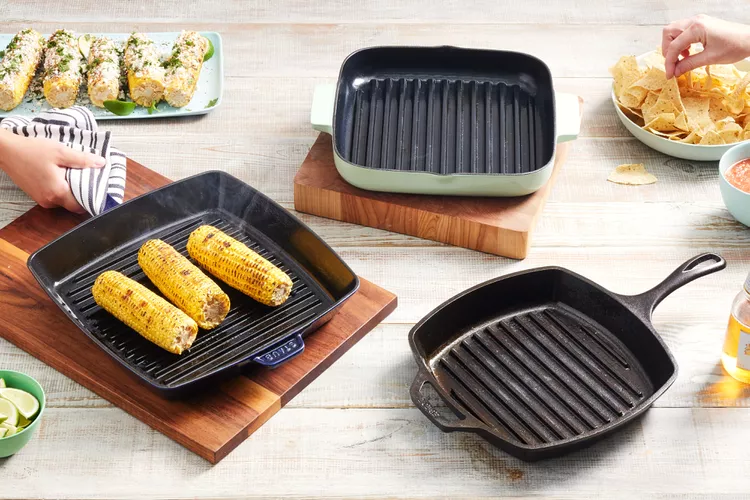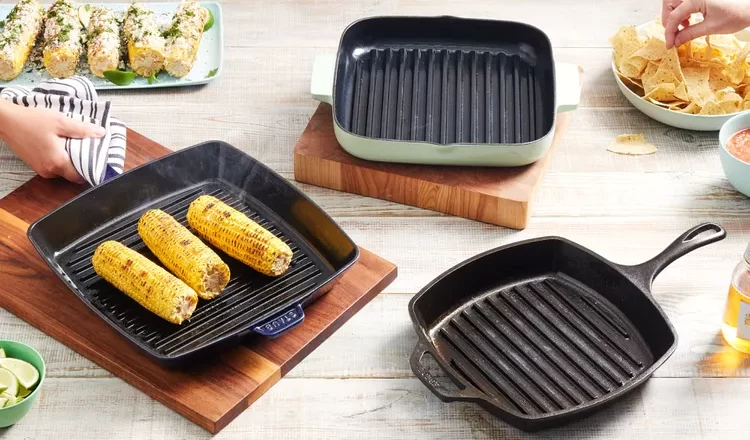Welcome to the definitive guide on how to store cast iron pans. If you’re a proud owner of a cast iron skillet or Dutch oven, you know that these durable and versatile pieces of cookware are a kitchen staple. However, to keep them in their best condition, proper storage is essential. Improper storage can lead to rust, damage, and even a shorter lifespan for your pans. In this article, we’ll delve into a range of methods and practices to help you store your cast iron pans effectively.

Why Proper Storage is Essential
The importance of proper storage can’t be overstated. Cast iron cookware needs to be stored in a way that protects it from moisture, prevents rust, and keeps it readily accessible for use. Let’s look at why each of these factors is so critical.
Preventing Rust
Rust is the nemesis of cast iron. Even a small amount of moisture can trigger rusting, which can damage the pan and even make it unsafe to use. Proper storage helps keep moisture at bay.
Protecting the Seasoning
The seasoning of your cast iron pan, which gives it that lovely non-stick surface, needs to be preserved carefully. Improper storage can scrape off seasoning, requiring you to reseason your pans more frequently. If youre uncertain about how to reseason your cast iron, you can find helpful instructions here.

Basic Storage Techniques
Let’s start with the basics. There are essential storage techniques that every cast iron owner needs to know. These simple yet effective tips will help keep your cast iron pans in top condition.
Clean and Dry Thoroughly
Before storing your cast iron pans, it’s crucial that they are cleaned and dried thoroughly. Any residual food or moisture can lead to rust. Follow our guide on cleaning cast iron skillet after cooking hash browns for more tips.
Use Pan Protectors
Pan protectors are a simple yet effective way to prevent scratches and preserve the seasoning of your cast iron pans. These are especially useful if you need to stack your pans.

Advanced Storage Methods
If you want to go the extra mile, there are advanced storage methods that can offer even more protection and convenience. These methods are a bit more involved but are well worth the effort.
Hanging Storage
Hanging your cast iron pans is an excellent way to store them. This method allows air to circulate freely around the pans, minimizing the risk of moisture buildup. Make sure to use sturdy hooks that can bear the weight of the pans.
Shelf Storage
Designate a specific shelf for your cast iron cookware. Line the shelf with a soft cloth or paper towels to prevent scratches. This method keeps your pans easily accessible and organized.

Do’s and Don’ts of Cast Iron Storage
There are specific do’s and don’ts that every cast iron pan owner should be aware of. Adhering to these guidelines will help ensure the longevity and functionality of your cookware.
Do Store in a Dry Place
Always ensure your cast iron pans are stored in a dry place. Even a slightly damp environment can cause rust to form over time.
Don’t Use Plastic Bags
Avoid storing cast iron pans in plastic bags or containers. These can trap moisture, which is detrimental to cast iron.
Special Considerations for Different Types of Cast Iron Cookware
Different types of cast iron cookware require slightly different storage techniques. Whether you have a skillet, Dutch oven, or griddle, knowing the best way to store each type is essential.
Skillets
Skillets are versatile and often used frequently. Store them in a way that keeps them easily accessible. Hanging or stacking with protectors are good options.
Dutch Ovens
Dutch ovens are larger and heavier, making them more challenging to store. Consider a designated shelf or even a hanging solution if space permits.
Griddles
Griddles can be stored flat, but ensure they’re in a dry place. Using pan protectors is also advisable to prevent scratches.
Common Mistakes to Avoid
Even seasoned cast iron users can make mistakes in storage. Avoiding these common pitfalls can save you time and effort in the long run.
Storing While Wet
Never store a cast iron pan while its still wet. Even a small amount of residual moisture can lead to rust development.
Neglecting the Seasoning
Don’t forget to maintain the seasoning on your pans. Regularly check and reseason as needed. For a detailed guide on reseasoning your cast iron, visit this page.
Storage Solutions for Small Kitchens
In a small kitchen, storage space is at a premium. Here are some tips to help you store your cast iron cookware efficiently, even if you’re short on space.
Utilize Vertical Space
Make use of vertical storage options like wall hooks or ceiling racks. These can free up valuable cabinet space.
Stack Wisely
If you need to stack your pans, use pan protectors to prevent damage. Keep the most frequently used pans on top for easy access.
Investing in Quality Storage Accessories
Investing in quality storage accessories is a wise decision for any cast iron owner. These accessories can help protect your cookware and extend its lifespan.
Pan Protectors
Pan protectors are inexpensive and can save you a lot of hassles by preventing scratches and damage to the seasoning.
Sturdy Hooks and Racks
Invest in sturdy hooks and racks that can bear the weight of your cast iron pans. Ensure they are securely mounted to prevent accidents.
Routine Maintenance and Storage
Routine maintenance goes hand-in-hand with proper storage. Following a regular maintenance routine will keep your cast iron pans in excellent condition.
Regular Cleaning
Regularly clean your cast iron pans to prevent buildup of food residue and ensure they are always ready for use. Follow our guide on cleaning after cooking hash browns.
Season as Needed
Keep an eye on the seasoning and apply a fresh layer as needed. This will help maintain the non-stick surface and prevent rust.
Using Cast Iron Frequently
Using your cast iron pans frequently keeps them in good condition. Regular use ensures the seasoning remains intact and the pans stay in top shape.
Cooking Diverse Dishes
Try to use your cast iron pans for a variety of dishes. This helps in maintaining an even seasoning. Check out our guide on cooking a roast in a cast iron skillet.
Avoiding High Acidity Foods
While cast iron is versatile, it’s best to avoid cooking highly acidic foods frequently, as they can wear down the seasoning.
Expert Tips for Long-Term Storage
If you need to store your cast iron pans for an extended period, follow these expert tips to ensure they remain in excellent condition.
Apply a Layer of Oil
Before long-term storage, apply a thin layer of oil to the pan’s surface. This creates a protective barrier against moisture.
Wrap in Paper Towels
Wrap your pans in paper towels or a soft cloth to protect them from dust and minor impacts.
Why Choose Cast Iron?
Cast iron pans are a worthy investment. They are incredibly durable, offer excellent heat retention, and can be used on various cooking surfaces, including induction cooktops and ovens.
Durability
Cast iron pans can last a lifetime if properly maintained. They can withstand high temperatures and regular use without warping or deteriorating.
Versatility
Whether you’re frying, baking, or roasting, cast iron pans are versatile enough to handle a wide range of cooking tasks. For Dutch oven recipes, visit this link.
Conclusion
Properly storing your cast iron pans is essential for maintaining their longevity, performance, and safety. By following these tips and techniques, you can ensure that your cast iron cookware remains in top condition for years to come. Whether you’re a seasoned chef or a novice cook, these storage solutions will help you make the most of your cast iron pans.
Frequently Asked Questions
Can I stack cast iron pans?
It’s okay to stack cast iron pans, but be sure to use pan protectors between them to prevent scratches and preserve the seasoning.
Is it safe to hang cast iron pans?
Yes, hanging cast iron pans is a great storage method. Just ensure that the hooks and racks are sturdy enough to support the weight.
Do I need to season my cast iron pan before storage?
If you’re storing your cast iron pan for an extended period, it’s a good idea to apply a thin layer of oil to maintain the seasoning and prevent rust.
As an Amazon Associate, I earn from qualifying purchases.
As an Amazon Associate, I earn from qualifying purchases.

